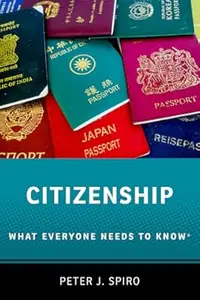
Free Download Peter J. Spiro, "Citizenship: What Everyone Needs to Know®"
English | 2019 | pages: 193 | ISBN: 0190917296, 019091730X | PDF | 5,2 mb
Almost everyone has citizenship, and yet it has emerged as one of the most hotly contested issues of contemporary politics. Even as cosmopolitan elites and human rights advocates aspire to some notion of "global citizenship," populism and nativism have re-ignited the importance of national citizenship. Either way, the meaning of citizenship is changing. Citizenship once represented solidarities among individuals committed to mutual support and sacrifice, but as it is decoupled from national community on the ground, it is becoming more a badge of privilege than a marker of equality. Intense policy disagreement about whether to extend birthright citizenship to the children of unauthorized immigrants opens a window on other citizenship-related developments. At the same time that citizenship is harder to get for some, for others it is literally available for purchase. The exploding incidence of dual citizenship, meanwhile, is moving us away from a world in which states jealously demanded exclusive affiliation, to one in which individuals can construct and maintain formal multinational identities. Citizenship does not mean the same thing to everyone, nor have states approached citizenship policy in lockstep. Rather, global trends point to a new era for citizenship as an institution.
In Citizenship: What Everyone Needs to Know®, legal scholar Peter J. Spiro explains citizenship through accessible terms and questions: what citizenship means, how you obtain citizenship (and how you lose it), how it has changed through history, what benefits citizenship gets you, and what obligations it extracts from you-all in comparative perspective. He addresses how citizenship status affects a person's rights and obligations, what it means to be stateless, the refugee crisis, and whether or not countries should terminate the citizenship of terrorists. He also examines alternatives to national citizenship, including sub-national and global citizenship, and the phenomenon of investor citizenship. Spiro concludes by considering whether nationalist and extremist politics will lead to a general retreat from state-based forms of association and the end of citizenship as we know it. Ultimately, Spiro provides historical and critical perspective to a concept that is a part of our everyday discourse, providing a crucial contribution to our understanding of a central organizing principle of the modern world.
